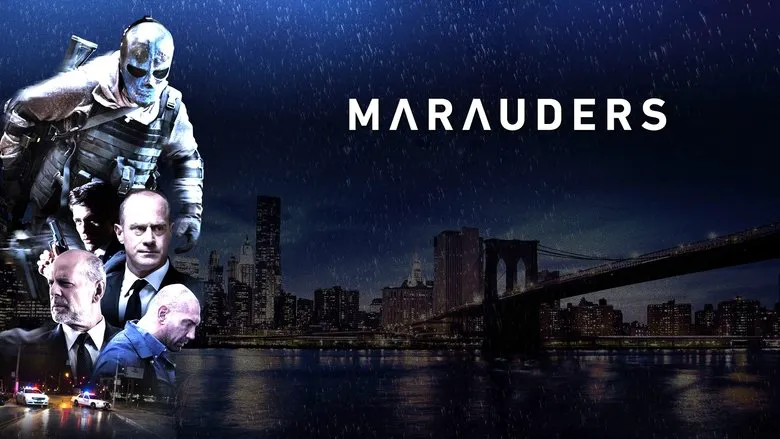Marauders: A Predictable Heist That Falls Flat
In the overcrowded landscape of action thrillers, “Marauders” emerges as a prime example of a production that, despite its attempts at suspense, ultimately feels thoroughly contrived, poorly acted, and conceptually incomplete. While a few scattered action sequences manage to deliver a fleeting visual punch, they are far from enough to redeem a narrative that consistently struggles to engage. Frankly, skipping this one altogether means missing very little, save for a few moments of fleeting explosion or gunfire that quickly fade into an otherwise forgettable experience.
The plot unravels in Cincinnati, Ohio, as a series of brutal bank robberies sends shockwaves through the city. These aren’t your typical high-stakes, big-money heists; the audacious thieves operate with a chilling precision, seemingly pursuing their own obscure and convoluted objectives. Their methods are ruthless: each robbery culminates in the inexplicable death of a branch manager. The alarming pattern, coupled with the fact that all targeted branches belong to the same formidable financial institution, swiftly lands the perplexing case on the desk of FBI Special Agent Montgomery. Fate, or perhaps a lack of originality, dictates that the state’s finest detectives are now thrust into a frantic hunt for these elusive gangsters, who frustratingly leave behind planted clues hinting at a connection to a long-deceased Marine.
It’s worth noting a curious detail regarding the production: the real-life Stock Yard Bank & Trust in Cincinnati was transformed into a massive film set for several days. This impressive logistical feat saw the fully operational financial institution temporarily halt all transactions, providing an authentic backdrop to the cinematic chaos.
Bruce Willis: Echoes of a Departed Era
For many, Bruce Willis was synonymous with quality action cinema. Do you recall the glory days when his mere presence seemed to elevate every film he graced, bringing a palpable sense of satisfaction to audiences worldwide? Ah, those were indeed the years! Willis’s films, while not always critical darlings, were box office reliable and beloved by casual viewers. They were quintessential examples of popcorn entertainment executed with panache.
However, those halcyon days feel like a distant memory, firmly rooted in the last century. For the better part of the past fifteen years, Willis’s performances have regrettably elicited little more than indifferent grunts. His once-potent name has inexplicably lost its weight, along with the magic that once guaranteed a certain level of entertainment quality. The actor himself, sadly, now often appears deflated, a shadow of the magnetic screen presence he once was. One might hope that a return to the gritty, intense action genre, which he virtually defined, could reignite the love and admiration for this once-adored action star. Yet, in “Marauders,” such hopes are swiftly dashed. Here, Willis unfortunately stands out as the weakest link, his moments on screen proving more detrimental than beneficial to the film’s already faltering momentum.
Truth be told, it’s inherently foolhardy to anticipate anything groundbreaking from a project that is so overtly disposable. Featuring a motley crew of primarily second- or third-tier actors and recycling a tired bank robbery theme, “Marauders” telegraphs its intentions from the outset. There is not a single name in the opening credits that would compel the average viewer to rush to pre-buy a movie ticket, nor is there anything particularly captivating or inviting about the promotional poster or accompanying trailer. And honestly, that should come as no surprise – how can a bland B-movie expect to have a beautiful, standout cover?
“Marauders” is precisely that: a textbook B-movie. Its design feels less like a work of artistry and more like a coldly calculated, artificial succubus, draining any hope of genuine engagement. Everything within its runtime seems meticulously timed to the second: when to orchestrate a minor explosion, when to inject a forced moment of drama, when to launch a profanity-laced tirade. The plot is simple, almost lazily so, straining desperately to surprise with a predictable cliffhanger that largely induces boredom rather than suspense. The characters are a standard set of uninspired archetypes, motivations dull and unimaginative – there is absolutely nothing to truly grab or hold your attention.

Generic Attempts at Emotional Resonance
The film’s attempts to breathe “life” or, more accurately, “humanity” into its characters are almost laughable in their transparent application of clichés. We have the weary police officer burdened with a wife battling cancer, compelling him to resort to stealing money from crime scenes – a subplot so worn it barely registers. Another character is haunted by the tragic loss of his wife to a criminal gang, a trope so familiar it garners little sympathy. A third awkwardly tries to impress a girl by regaling her with sweet but utterly unconvincing stories about getting high in his youth. These are not merely clichés; they are clichés utterly devoid of any semblance of believability or genuine emotional weight.

And then there’s the aforementioned Willis, who is relegated to delivering a handful of pompous but ultimately pointless lines. Observing his weary screen presence, one can almost feel the strong urge to simply get up and leave the theater immediately. It’s a truly pathetic sight to behold – these characters, ostensibly burdened with this superficial “humanity,” only sink faster into the mire of unengaging storytelling. Fun fact for trivia buffs: Adrian Grenier’s character is repeatedly alluded to as a “G.I. Joe soldier.” An interesting, if ironic, coincidence given that Bruce Willis himself starred in a film adaptation based on that very toy line not too long ago.
However, there’s little need to truly agonize over the plight of these thinly written characters, because films like “Marauders” aren’t crafted for viewers to genuinely empathize with the losses of fictional cops or the existential fate of a spider clinging precariously to a skyscraper window. The core purpose, presumably, revolves entirely around the bank robbery scenes (or several distinct scenes, if the audience is fortunate enough to be momentarily entertained). And here, finally, a small ray of relief: at least that aspect isn’t entirely hopeless.
The screenwriters, to their minimal credit, do manage to conjure up a few new twists for the actual robbery sequences each time. “Marauders” is no exception, featuring some moderately stylish masks, an original gimmick involving recorded commands to intimidate victims, and an escape plan orchestrated with a seemingly clever 15-minute head start. The film is, arguably, somewhat watchable during these isolated episodes of action. But the question remains, resonating with a sigh: is it genuinely worth enduring the vast swathes of disjointed plotting and wooden acting for such a negligible, fleeting pleasure?
Realistically, perhaps somewhere among the millions of viewers, there are devoted fans of Christopher Meloni who will not be entirely disappointed – the actor reliably swears heartily, adopts his signature stern face, and authoritatively barks orders at his subordinates. Perhaps the few fans of Dave Bautista will genuinely want to see their idol in a suit and glasses, an ensemble which, of course, suits him about as well as a saddle suits a pig. And we don’t rule out the possibility that a handful of Adrian Grenier’s female fans might peek into the cinema for the sole purpose of admiring the handsome young man.
However, for virtually everyone else, the cinematic pickings are incredibly slim. The film is fundamentally simple, its characters dim-witted to a fault, and its plot is so anemic it effectively limps along on both legs, barely maintaining a convincing shred of realism. Moreover, the once-mighty draw of Bruce Willis now tragically feels more likely to scare viewers away from multiplexes than attract them. “Marauders” wasn’t meant to be a cinematic miracle, and indeed, it is anything but. Consider this your warning; the marauders of derivative cinema have already plundered everything remotely interesting from this one.